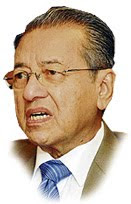Saturday September 12, 2009
Should renminbi be a reserve currency?
Think Asian
By ANDREW SHENG
I ALWAYS find it strange that people should debate whether the renminbi (RMB) should be a reserve currency when it is officially still under exchange control. We still remember that as late as 1993, China used foreign exchange certificates.
As we have seen from the experience of the yen and euro in the previous articles, there are both advantages and disadvantages for a national currency being used as a reserve currency.
The obvious advantage is the seigniorage, but in a world of almost zero interest rates, this benefit is very small indeed.
The second is the increase in financial services and commercial business that comes from the global use of the reserve currency.
New York and London benefit considerably as international financial centres that trade financial products denominated in global currencies.
The third advantage is the prestige of having a reserve currency.
There are also disadvantages.
A reserve currency means that foreigners will hold large amounts of currency that can freely move in and out. Hence, one of the pre-conditions of any reserve currency is the ability of the issuing central bank to control the value of the reserve currency through appropriate monetary policy.
This implies a stable exchange rate and also low level of inflation.
This is precisely the problem faced by the US dollar, called the Triffin Dilemma – the tension between national monetary policy and global monetary policy.
In 1998, when the Federal Reserve realised that the world was plunging into a global crisis, it lowered interest rates and reflated not only the US economy, but also the global economy.
The US could do that because it was fundamentally strong and US consumption was the real engine of global growth.
But continuous deficits add up to excess borrowing that is unsustainable.
The dilemma is that in a world of free capital flows, any central bank that raises interest rates to control domestic borrowing will invite in a tonne of hot capital flows, creating more asset bubbles.
If the country maintains flexible exchange rates, the country will not only have exchange rate appreciation that encourages imports, but also worsening current account deficit funded by short-term capital inflows.
In other words, the Triffin Dilemma imposes large costs on the reserve currency country, because if the world demands greater liquidity, the reserve country must run a deficit to increase the global money supply.
But if the reserve country runs too large a deficit, then a financial crisis is inevitable.
There is no free lunch.
Can we solve the problem by creating a global central bank and a global super-regulator?
The answer is no, because if we have a global monetary policy, some regions and sectors will be winners and some will be losers. Thus, the pre-condition for a global central bank is a global fiscal mechanism that is able to tax the winning sectors to compensate the losing sectors.
Without such a fiscal compensatory mechanism, no sovereign country will be willing to cede its monetary policy to a global central bank without some assurance that they could receive some fiscal assistance. The euro can work with a European Central Bank because such a fiscal mechanism exists in the EU.
A further issue for any currency becoming a reserve currency is that this is not a policy issue, but really a market decision.
Ultimately the market decides if the currency becomes a reserve currency.
The yen experience shows that if there is high volatility in the exchange rate, the market will not use the currency extensively as a reserve currency.
With a zero interest rate policy, the central bank cannot use interest rates as a tool to stabilise the exchange rate, so that speculative forces, largely the yen carry-trade, move the exchange rate.
This is where the present decision to establish several pilot RMB clearing centres in Hong Kong and border cities is a pragmatic move to facilitate market needs.
Trade in the border areas of China with other countries is facilitated when the traders are willing to use RMB as a convenient medium of exchange. The RMB swap arrangements with various central banks are also trade-facilitating moves to help the use of domestic currencies on a bilateral basis.
Some people think that high foreign exchange reserves are a pre-condition for reserve currency status.
Central banks used to measure foreign exchange reserves in terms of months of imports. But this is an outdated measure.
Annual world merchandise exports amounted to US$15.8 trillion in 2008, whereas foreign exchange transactions amount to US$3.2 trillion daily or roughly US$800 trillion annually. This means that exchange rates are determined not by physical trade, but by capital market flows.
In other words, one of the conditions for RMB opening up is whether the exchange rate is stable over the long term.
This requires very skillful monetary policy to sterilise speculative flows, supported by strong fiscal conditions with very resilient and strong domestic financial systems that can absorb external shocks.
In an era of global zero interest rates, it will not be easy to manage market stability because of hugely leveraged speculative flows.
At near zero interest rates, the cost of speculation is very low, but the costs to each economy of de-stabilisation are very high.
Who else wants to be a reserve currency?
·Andrew Sheng is author of forthcoming book published by Cambridge University Press, “From Asian to Global Financial Crisis.”
Subscribe to:
Post Comments (Atom)







































No comments:
Post a Comment